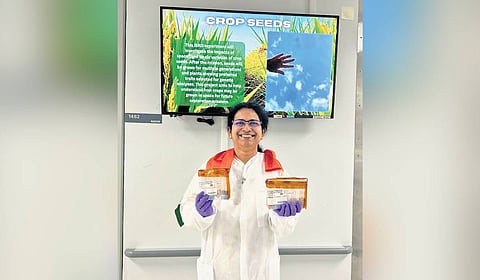Indian astronaut Shubhanshu to experiment with Kerala-developed seeds in space
THIRUVANANTHAPURAM: As India’s Shubhanshu Shukla, along with three other astronauts, headed to the International Space Station (ISS) as part of the Axiom-4 mission on Wednesday, he has taken along with him six varieties of seeds developed exclusively in Kerala, along with other specimens, for conducting various experiments in space.
The main aim of the experiment with seeds is to examine how space conditions such as micro-gravity impact the germination, growth, and viability of food crop seeds. Since the conditions in the ISS are limited, the experiment would identify factors that can help in the development of crops in restricted environments.
The experiment is the brainchild of the Thiruvananthapuram-based Indian Institute of Space Science and Technology, (IIST), established by ISRO. The seeds were developed by Kerala Agricultural University (KAU) in its various centres. The European Space Agency has also partnered in the project for its technical aspects.
The seeds selected for the space experiment include locally-developed crop varieties noted for their high yield. The specimens are: Jyothi and Uma (rice), Kanakamani (cowpea), Thilakathara (sesame), Soorya (brinjal/eggplant) and Vellayani Vijay (tomato).
“The seeds require complex hardware support to ensure their survival in space and also to record the minute changes that happen over the days. Shukla will not be required to open the seed chamber for the experiment but he will be involved in capturing the scientific imagery and carrying out visual inspection of the specimens,” Prof K G Sreejalekshmi of IIST, who is the principal investigator of the project, told TNIE.
The specimens were sent to space to also validate the findings of earlier experiments carried out by the space biology wing of IIST in a simulated micro-gravity environment. “The findings, we believe, will help in the development of climate resilient crops that can survive with limited resources,” Sreejalekshmi said.
According to Beena R of KAU, who is the co-principal investigator of the project, close to 4,000 seeds in six varieties were sent to space. These will be brought back to earth and planted in controlled environments. “Detailed analysis will be carried out to assess changes in growth, resilience and productivity after their prolonged exposure in a micro-gravity environment,” she said.

